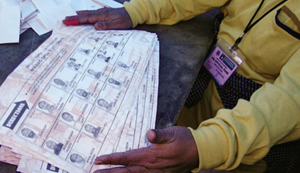9 December is International Anti-Corruption Day–to raise awareness of corruption and of the role of the United Nations Convention against Corruption (external website) in combating and preventing it.
Corruption is a significant barrier to overcoming poverty. It undermines economic growth and social development, diverts resources away from aid and development, and threatens security and political stability.
The World Bank 2011 study, 'Barriers to Asset Recovery', conservatively estimates that developing countries lose between US$20–$40 billion a year through corrupt acts. These are resources that could be spent on improving things like health, education and infrastructure. The loss of these resources to development outcomes can prevent countries from achieving the Millennium Development Goals. Corruption also has a disproportionate impact on the poor who are least able to pay bribes to access essential services such as education and health care.
Countries with higher levels of corruption have made less progress on improving rates of education, maternal health and access to clean water than countries with more transparent and accountable systems. Transparency International reports that high levels of corruption leads to higher illiteracy rates, and that a prevalence of bribery has been linked to higher death rates for women in childbirth and less access to safe water. There are also more subtle forms of corruption that undermine the quality and quantity of public services–absenteeism among teachers and doctors may mean that schools and clinics are not available.
A study by the World Bank shows that countries that tackle corruption and improve governance systems can bring down infant mortality by almost two-thirds, increase incomes by almost three fold, and raise literacy rates by up to 25 per cent.
What is Australia doing?
Australia works closely with partner governments to support their efforts to combat corruption and improve transparency and accountability.
- In the Philippines, AusAID is supporting the Bantay Escuwela School Watch Project which has helped train more than 600 community members to track government spending in the education sector. Parents, teachers, students and community representatives can hold the government to account by monitoring provincial government decision-making and expenditure on education.
- In Indonesia, AusAID's programs for school construction and road development are integrating systems to handle public complaints and thereby reduce opportunities for corruption.
- In Vietnam, AusAID is improving transparency by supporting the State Audit of Vietnam to conduct value-for-money audits of the national target program for rural water supply and sanitation.
Australia also works with regional and international institutions and policy initiatives to directly shape and support the international anti-corruption agenda. AusAID is:
- Assisting developing countries to implement the United Nations Convention against Corruption (external website), considered the international standard for anti-corruption. This includes support to the United Nations Development Programme and the United Nations Office on Drugs and Crime.
- Supporting the global anti-corruption non-government organisation Transparency International (external website) to empower civil society, government and private sector stakeholders to advocate for anti-corruption reforms, improve access to justice for victims of corruption, and analyse the extent and causes of corruption.
- Supporting resource rich developing countries to increase transparency in oil, gas and mining industries through the Extractive Industries Transparency Initiative (external website). If well-managed, the revenue generated from extractive industries has the potential to increase economic growth and lift people out of poverty.
- Working with developing countries and financial centres to prevent the laundering of the proceeds of corruption and facilitating the timely return of stolen assets through supporting the joint World Bank–United Nations Office on Drugs and Crime Stolen Asset Recovery Initiative (external website).

